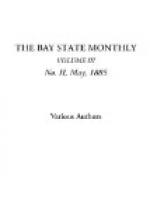Charles Sumner often differed from the President, and on the floor of the Senate Chamber frequently gave utterance to statements which carried grief into the White House. But Mr. Lincoln knew and understood Charles Sumner. An incident may here be recalled. The President was solicitous that his views, as embodied in an act then claiming the attention of Congress, should become law prior to the adjournment of that body on the 4th of March. Mr. Sumner opposed the bill, because he thought it did not sufficiently guard the interests of the freedmen of that State. Owing to the opposition of the Senator and a few of his friends the bill was defeated. Mr. Lincoln felt displeased, and the newspapers throughout the country published that the friendship which had so long existed between the two men was at an end.
But Mr. Lincoln was not a man who would withdraw friendship on account of an honest difference of opinion. It was not he who made the mistake of urging the dismissal of Mr. Sumner from the chairmanship of the Senate Committee on Foreign Relations. On the 4th of March Mr. Lincoln was reinaugurated; on the evening of the 6th occurred the Inauguration Ball. Mr. Sumner had never attended one of these state occasions, and he did not purpose doing so at this time until he received, in the course of the afternoon, the following letter:—
DEAR MR. SUMNER,—Unless you
send me word to the contrary, I shall
this evening call with my carriage at
your house, to take you with
me to the Inauguration Ball.
Sincerely yours,
ABRAHAM LINCOLN.
The great Senator entered the ball-room, with Mrs. Lincoln leaning on his arm, and took his seat by the side of the President. The evening was pleasantly spent, and the newspapers at once discovered how great a blunder they had made.
At length the curtain fell upon the bloody scenes of the war. Under the mighty blows of Grant and his lieutenants the Rebellion was crushed. On a bright day the President, accompanied by Mr. Sumner, entered the streets of Richmond, and witnessed the grateful tears of thousands of the race he had redeemed from bondage and disgrace. Having returned to Washington, he convened a cabinet council on the 14th of April. During the session his heart overflowed with kind and charitable thoughts towards the South, and towards those officers who had deserted the flag of their country in her trying hour he poured out a forgiving spirit.
After that cabinet meeting he went to drive with Mrs. Lincoln,—they two were alone. “Mary,” said he, “we have had a hard time of it since we came to Washington; but the war is over, and, with God’s blessing, we may hope for four years of peace and happiness, and then we will go back to Illinois and pass the rest of our lives in quiet. We have laid by some money, and during this term we will try and save up more, but shall not have enough to support us. We will go back to Illinois, and I will open




